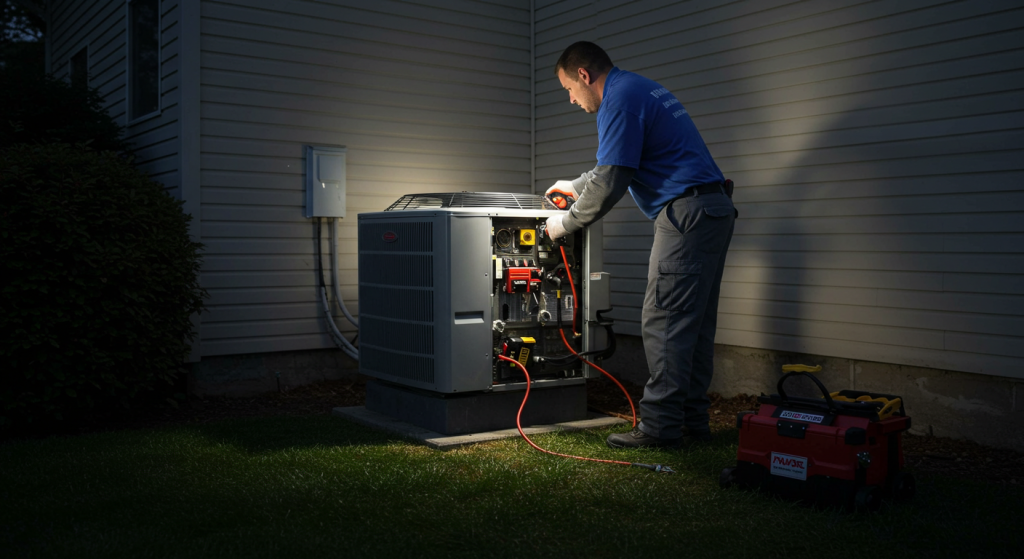When your heat pump stops working, it can disrupt your comfort and peace of mind. At Obie Comfort Solutions, we understand how stressful these situations can be, especially during extreme weather. Here’s a guide to help you take swift action, identify potential issues, and know when it’s time to call in the experts. Remember, we’re not comfortable until you’re comfortable. Learn more about why professional heat pump repairs are essential for your safety and long-term system performance.

Key Takeaways
- Recognizing early warning signs such as unusual noises or inconsistent heating can help you avoid costly breakdowns.
- Safety is paramount—always address concerns like gas leaks or electrical problems immediately.
- Regular maintenance, like filter checks and annual inspections, can help prevent heat pump failures.
How to Tell If Your Heat Pump Is Failing
Spotting problems early can save you time, money, and discomfort. Look for these common warning signs:
- Unusual Noises: Grinding, clanking, or banging sounds often indicate loose or broken components.
- Reduced Airflow: Blocked filters, obstructed ducts, or malfunctioning blowers can restrict airflow.
- Inconsistent Heating or Cooling: Uneven temperatures may signal compressor or thermostat issues.
- Frequent Cycling: Short or irregular cycles may indicate thermostat malfunctions or refrigerant problems.
- Ice Buildup: Excess ice on the unit can point to defrost cycle issues or restricted airflow.
By addressing these signs early, you can prevent minor issues from escalating into major failures.
Safety Steps to Take During a Heat Pump Emergency
Your safety should always come first during a heat pump failure. Take these precautions immediately:
- Gas Leaks: If you smell a rotten egg odor, leave your home and call emergency services. Avoid using electrical devices.
- Electrical Issues: Turn off the system to prevent further hazards or damage.
- Carbon Monoxide Exposure: Symptoms such as dizziness, nausea, or confusion require immediate medical attention.
Always shut off power to your system before attempting any troubleshooting.
Quick Troubleshooting Tips Before You Call
Before calling a professional, try these simple troubleshooting measures:
- Check Thermostat Settings
- Ensure it’s set to the correct mode (heating or cooling).
- Replace dead batteries or recalibrate if necessary.
- Persistent issues may require professional inspection.
- Inspect Power Supply and Circuit Breaker
- Check for tripped breakers and reset if needed.
- Frequent trips may indicate deeper electrical problems requiring expert attention.
- Examine Air Filters and Vents
- Replace filters if they’re dirty or clogged.
- Ensure vents are open and free of obstructions.
- Regular filter changes (every three months) improve airflow and efficiency.
- Look for Refrigerant Leaks
- Signs include hissing sounds, ice buildup, or reduced heating efficiency.
- Turn off the system and contact a certified technician immediately.
- Clear Debris Around the Outdoor Unit
- Remove leaves, dirt, and other debris to maintain airflow.
- Keep the area around the unit clear to ensure proper operation.
- Reset the System Safely
- Refer to your user manual for reset instructions.
- Follow manufacturer guidelines to avoid further damage.
When to Contact a Certified Heat Pump Repair Tech
Some problems require the expertise of a trained technician. Contact a professional if you encounter:
- Complex Repairs: Issues such as gas leaks, refrigerant problems, or compressor failures.
- Persistent Problems: Troubleshooting doesn’t resolve the issue, or problems keep recurring.
- Repeated Failures: Frequent cycling, electrical issues, or unusual noises that don’t go away.
At Obie Comfort Solutions, our licensed and NATE-certified technicians specialize in diagnosing and repairing heat pump issues. For urgent needs or recurring malfunctions, discover why heat pump repairs should be done by professionals to ensure safety and long-term performance. We’re committed to delivering reliable and personalized service to keep your home comfortable year-round.
Prevent Emergencies with Regular Heat Pump Service
Proactive care can save you from emergencies and costly repairs. Follow these tips to keep your heat pump running smoothly:
- Schedule Seasonal Inspections: Regular tune-ups identify potential issues and optimize system efficiency.
- Replace Filters Regularly: Clean or replace filters every three months to ensure proper airflow.
- Clean the Outdoor Unit: Remove debris and keep the area clear to maintain performance.
- Listen for Unusual Noises: Address small problems before they become major concerns. For best results, trust the benefits of professional heat pump maintenance to extend system life and boost efficiency. Consistent maintenance extends your system’s lifespan and enhances efficiency, saving you money over time.
What to Remember During a Heat Pump Emergency
Dealing with a heat pump failure doesn’t have to be overwhelming. By recognizing warning signs, prioritizing safety, and performing basic troubleshooting, you can minimize stress and discomfort. When the issue requires professional expertise, Obie Comfort Solutions is here to help with exceptional service and a commitment to your comfort. Schedule your next visit and consider bi-annual heat pump maintenance to ensure year-round reliability and energy savings.
Frequently Asked Questions
What are the early warning signs of heat pump failure?
Unusual noises, reduced airflow, inconsistent heating or cooling, frequent cycling, and ice buildup are common indicators.
What should I do if I detect a gas leak?
Evacuate immediately and contact emergency services. Avoid using electrical appliances to prevent ignition.
How can I check if my thermostat is causing heating issues?
Ensure it’s set correctly, check for weak connections or faulty wiring, and replace the batteries if needed.
When should I call a professional HVAC technician?
Call a technician if troubleshooting fails or for serious issues like gas leaks, refrigerant problems, or compressor failures.
Why is regular maintenance important for my heat pump?
Regular maintenance prevents failures, improves efficiency, and extends the system’s lifespan, saving you money in the long run.
